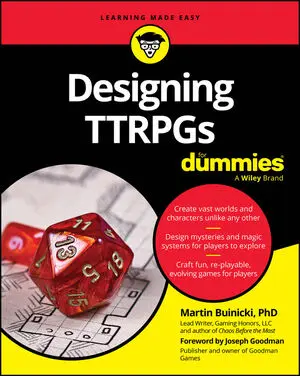Articles & Books From Role Playing
Create your own epic tabletop adventures Tabletop role-playing games (also known as TTRPGs) are social games that often center on playing fictional characters in a story or adventure. Designing TTRPGs For Dummies is an introductory romp into the creative and magical world of the game design process. This fun book guides you through character creation sheets, rule setting, worldbuilding, and beyond.
Cheat Sheet / Updated 11-03-2025
You have lots of information to keep track of when designing a tabletop role playing game (TTRPG). One helpful way to do this is to prepare lists of the important people, places, actions, and equipment you need to include in your game. To help you get started, I’ve prepared two examples: a list of basic TTRPG actions that the player characters (PCs) in your game might take and a list of key village locations — essential buildings and businesses normally found in settlements.
Cheat Sheet / Updated 04-26-2022
When you’re creating a character for your Dungeons & Dragons 4th Edition game, you want to choose the best powers, feats, skills, and gear for your character’s race and class. This Cheat Sheet provides tips for making wise power, feat, skill, and gear choices when you’re creating a new Dungeons & Dragons character.
Article / Updated 02-28-2020
D&D is a cooperative game, not a competitive one. In other words, you don't compete against the other players and you don't win by beating them. Instead, there are a lot of different ways to "win" the game. The common denominator in every victory condition is "fun." If you and the other players have fun, everyone wins a game of D&D.
Article / Updated 02-28-2020
A Dungeons & Dragons player character lives in an ancient time, in a world much like ours was in medieval times, when knights and castles filled the land. Imagine this place, where magic really works and dragons roam in the dark beyond the firelight. Your character might be a strong fighter or a nimble rogue, a wise cleric or a charismatic sorcerer.
Article / Updated 02-28-2020
Take your Dungeons & Dragons 4th Edition character on an adventure using these battle grids. One battle grid is blank, so you can customize it to your particular adventure, or just use it as a large, open area to practice combat against monsters. The other battle grid is divided into several rooms, which you can use as the basis for a small dungeon.
Article / Updated 04-26-2016
Where does Vampire's mythology diverge from popular belief? Where do the conceits ring true? The following statements outline real-world legends of the undead, clarifying their truth or falsity in the World of Darkness. Vampires must sustain themselves on the blood of the living: Fact. For the Kindred, the act of feeding is highly sensual.
Article / Updated 04-26-2016
Everyone knows Hollywood's take on the vampire myth, and how to go about destroying one of the undead. Confront her with a crucifix or garlic. Immerse her in running water. Cut off her head. Stake her in the heart. All these techniques derive from real myth, but not all of these myths actually work in the World of Darkness, or at least there's only a kernel of truth to some of them.
Article / Updated 03-26-2016
As in any social experience, a Dungeons and Dragons game benefits from common courtesies and ground rules that are followed by players and DMs alike. The following provides some of the unwritten ground rules of a game session, now written down for everyone to use. Being ready to run the game The DM needs to be prepared to run the game session.
Article / Updated 03-26-2016
Many Dungeon Masters choose to create their own adventures and campaigns out of nothing more than their imaginations. If you're one of those DMs, good for you! Devising exciting adventures and crafting a fantastic world for your D&D game are some of the most rewarding parts of being a Dungeon Master. However, even the most creative DM can use a helping hand every now and then.



